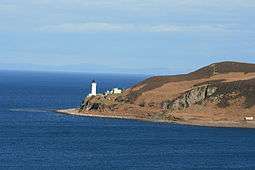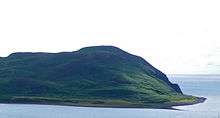Davaar Island
| Gaelic name | Eilean Dà Bhàrr |
|---|---|
| Meaning of name | "Barr's island" |
 Davaar Island and Lighthouse | |
| Location | |
 Davaar Island Davaar Island shown within Argyll and Bute | |
| OS grid reference | NR760200 |
| Physical geography | |
| Island group | Firth of Clyde |
| Area | 52 ha |
| Area rank | 198 [1] |
| Highest elevation | 115 m |
| Administration | |
| Sovereign state | United Kingdom |
| Country | Scotland |
| Council area | Argyll and Bute |
| Demographics | |
| Population | 0 |
| References | [2][3] |
 Davaar Island Lighthouse | |
 Scotland | |
| Location |
Davaar Island Campbeltown Loch [Argyll and Bute]] Scotland United Kingdom |
|---|---|
| Coordinates | 55°25′42″N 5°32′26″W / 55.428209°N 5.540505°W |
| Year first constructed | 1854 |
| Automated | 1983 |
| Construction | masonry tower |
| Tower shape | cylindrical tower with balcony and lantern |
| Markings / pattern | white tower, black lantern, ochre trim |
| Height | 20 metres (66 ft) |
| Focal height | 37 metres (121 ft) |
| Light source | mains power |
| Intensity | 300,000 candela |
| Range | 23 nautical miles (43 km; 26 mi) |
| Characteristic | Fl (2) W 10s. |
| Admiralty number | A4276 |
| NGA number | 4252 |
| ARLHS number | SCO-059 |
| Managing agent |
Northern Lighthouse Board[4] [5] |
Davaar Island or Island Davaar (Scottish Gaelic: Eilean Dà Bhàrr) is located at the mouth of Campbeltown Loch off the east coast of Kintyre, in Argyll and Bute, Scotland. It is a tidal island, linked to the mainland by a natural shingle causeway called the Dhorlin near Campbeltown at low tide. The crossing can be made in around 40 minutes.
Davaar was known as the island of Sanct Barre between the years 1449 to 1508. The modern form Davaar is from older Do Bharre - thy St Barre. Dr Gillies in his "Place Names of Argyll" appears to accept the popular derivation, Double-pointed (Da-Bharr) Island.
In 1854, a Lighthouse was built on the north of the island by the lighthouse engineers David and Thomas Stevenson. The lighthouse was automated in 1983, and today, Davaar is inhabited by caretakers, sheep, goats and mink.
The Lookout, a square building standing on a small knoll close to the lighthouse, was built during World War Two to house naval crews, whose task it was to stretch anti-submarine nets across the water, protecting Campbeltown. It is now rented out as a holiday home.[6]
The island is also known for its seven caves, one of which contains a life size cave painting depicting the crucifixion, painted in 1887 by local artist Archibald MacKinnon after he had a vision in a dream suggesting him to do so. The painting caused uproar in the area as it was seen as a sign from God; it is said that when the townsfolk discovered it was MacKinnon, and not God, he was exiled from the town indefinitely. Restored several times since, including twice by the original artist, the painting was vandalised in July 2006, having a red and black depiction of Che Guevara painted over the original masterpiece. It has since been restored again.[7]
Davaar Island is one of 43 tidal islands that can be walked to from the mainland of Great Britain and one of 17 that can be walked to from the Scottish mainland.[6]
In 2001 the island had a population of 2 as recorded by the census[8] but in 2011 there were no "usual residents" living there.[9]
Stamps

Local stamps were issued for Davaar in the 1960s. The stamps served the many visitors to the island who wished to have their mail posted there, and carried by the boatman to the nearest GPO Post Box at Campbeltown on the mainland. The boatman service ended some time in the early 1970s. Postage Rates were double those of the UK.[10]
See also
References
- ↑ Area and population ranks: there are c. 300 islands over 20 ha in extent and 93 permanently inhabited islands were listed in the 2011 census.
- ↑ Ordnance Survey
- ↑ Iain Mac an Tailleir. "Placenames" (PDF). Pàrlamaid na h-Alba. Retrieved 2007-07-23.
- ↑ Davaar The Lighthouse Directory. University of North Carolina at Chapel Hill. Retrieved 16 May 2016
- ↑ Davaar Northern Lighthouse Board. Retrieved 16 May 2016
- 1 2 Peter Caton (2011) No Boat Required - Exploring Tidal Islands. Matador.
- ↑ "Che vandal attacks Christ image". BBC News. 2006-08-01. Retrieved 11 December 2007.
- ↑ General Register Office for Scotland (28 November 2003) Scotland's Census 2001 – Occasional Paper No 10: Statistics for Inhabited Islands. Retrieved 26 February 2012.
- ↑ National Records of Scotland (15 August 2013) (pdf) Statistical Bulletin: 2011 Census: First Results on Population and Household Estimates for Scotland - Release 1C (Part Two). "Appendix 2: Population and households on Scotland’s inhabited islands". Retrieved 17 August 2013.
- ↑ "Modern British Local Posts CD Catalogue, 2009 Edition". Phillips. Retrieved 2008-12-08.
External links
| Wikimedia Commons has media related to Davaar Island. |
Coordinates: 55°25′22″N 5°32′28″W / 55.42278°N 5.54111°W